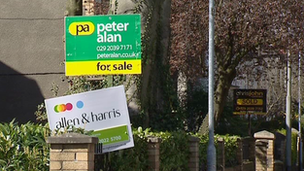Stamp duty plans explained to business and housing industry leaders
- Published

Stamp duty has already been devolved to Scotland
Plans to devolve stamp duty land tax to Wales have been outlined to leading housing and business figures.
The proposal was recommended by the Silk Commission's review of possible further devolved powers in Wales.
The tax is paid on the purchase of property and land worth more than 拢125,000 - starting at a 1% rate and rising to 7%, as the value increases.
One senior adviser said stamp duty was a "natural candidate" for devolution because it was easy to collect.
The proposals were outlined at a seminar hosted by the Welsh government and the employers' organisation the CBI, which included a presentation by Treasury officials
A Treasury consultation on the plans ends on 10 September.
The Welsh government sees control of stamp duty land tax as a way to boost the housing market and the construction industry.
Treasury Chief Secretary Danny Alexander announced in July a "short and targeted consultation" with business, likely to report in the autumn, when the UK government is now due to give its full response to the Silk report.
The UK government set up the commission to examine the future of the Welsh assembly's powers.
Chaired by former assembly clerk Paul Silk, , making 33 recommendations.
'Responsibility'
Senior Welsh government adviser and leading economist Gerry Holtham chaired a previous commission which recommended Welsh ministers should take charge of stamp duty land tax.
Speaking before attending Wednesday's seminar, he said taxes needed to be devolved to "increase the responsibility" of the Welsh government and the assembly.
"At the moment they get all of their money from a block grant (from the UK Treasury) so they don't have to raise any of the money, and there is no point in spending less than they're given because they'd only have to give it back to the Treasury.
"So, at the margin, they're not able to take a decision about how much tax and how much public expenditure the Welsh public want, need or ought to have.
"That isn't good, it doesn't encourage the right attitude to public spending."
Mr Holtham said stamp duty land tax was a "natural" candidate for devolution because it was difficult to avoid or evade and easy to collect.
Regeneration
Cardiff-based chartered surveyor Robert Chapman warned that devolving the tax could damage the Welsh economy's prospects, if ministers in Cardiff chose to bolster their revenue by increasing the level of tax.
But Mr Chapman also said ministers could chose to reduce stamp duty in some parts of Wales, which could help to regenerate less prosperous areas.
"Wales in relative terms, at the best of times, is marginal as a location for investment," he said.
"If you interviewed the top 50 investors, pan-Europe and pan- the world, Wales would not necessarily get on the radar.
"And I think we're got to create an environment and circumstances and perceptions about Wales which make it a much more attractive location to invest in.
"We mustn't do anything around stamp duty land tax that would be detrimental to that."
Speaking after the meeting, Finance Minister Jane Hutt said: "We had a very constructive discussion in which a range of important points were made about how this tax could be reformed to help boost the economy, jobs and growth, and assist the housing sector in Wales.
"I am working closely with the Treasury in taking forward a comprehensive financial reform package for Wales and was pleased that officials from the Treasury heard the views of the business community directly.
"I hope that everyone with an interest in this area will take the opportunity to register their views," she added.
Emma Watkins, director of CBI Wales who chaired the meeting, said: "CBI members had a constructive discussion today with Treasury and Welsh government officials on stamp duty devolution.
"As was clear from this morning's meeting, business engagement is critical to achieving successful devolution and reform of the stamp duty land tax regime in Wales."
- Published17 July 2013
- Published16 July 2013
- Published19 November 2012
- Published11 July 2013
- Published30 June 2013